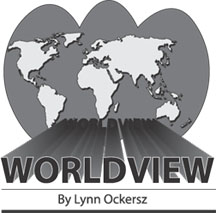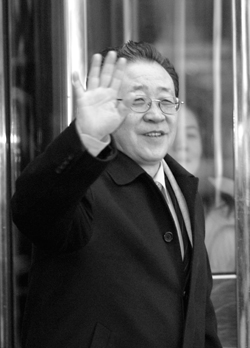Winds of change sweeping Korean peninsula
World View by Lynn Ockersz
 Seemingly ground-breaking bilateral talks between the US and North
Korea are raising hopes of a measure of reconciliation returning to the
divided Korean peninsula more than five decades after the Korean War. Seemingly ground-breaking bilateral talks between the US and North
Korea are raising hopes of a measure of reconciliation returning to the
divided Korean peninsula more than five decades after the Korean War.
The talks took place recently in New York between the countries'
nuclear negotiators, US Assistant Secretary of State Christopher Hill
and North Korean Deputy Foreign Minister, Kim Kye-gwan.
|

UNITED STATES: North Korea’s Vice Foreign Minister Kim Kye Gwan
leaves his hotel 6 March, 2007 in New York. (AFP)
|
North Korea, which was damned by US President George Bush in 2002 as
being part of an "Axis of Evil", along with Iran and Syria, has been on
a dangerous collision course with the West over its nuclear programme.
In fact Pyongyang exploded its first nuclear device last year and
thereby signalled its entry into the "Nuclear Club," which, of course,
consists of the world's biggest military powers.
Parallel to this arms race with the West, a process of six nation
talks, featuring North and South Korea, the US, Japan, Russia and China,
has been on over the past couple of years aimed essentially at
reunifying the two Koreas and resolving other outstanding issues between
the states.
Considerable scepticism has greeted the news that the US-North Korea
bilateral talks are holding out the promise of a breakthrough being
achieved in the tangled relations between the states but considering the
dire economic straits North Korea is finding itself in, some progress
could be hoped for in the negotiations.
This, once again, proves the point that "economics drive politics".
Nuclear power was the hard bone of contention between North Korea and
the West but it was with a view to wringing substantial economic
concessions from the West that Pyongyang sought a nuclear capability.
Now that it is said to possess the capability to process "a nuclear bomb
every year", it could do just that.
In fact an agreement arrived at between the US and North Korea at the
recent talks provides for the provision of 50,000 tonnes of fuel oil by
the US to North Korea, in return for the latter deactivating its
Yongbyon nuclear reactor. Following the deactivation, another 950,000
tonnes of fuel oil would be provided.
Pyongyang is also expected to agree to inspection visits of its
nuclear sites by the International Atomic Energy Agency.
While it is difficult to see North Korea foregoing the entirety of
its nuclear capability, its economic compulsions could be strong enough
to keep it going on the path of negotiations.
For, if economic growth is desired, North Korea would need to
integrate into the global economy and usher in a measure of economic
liberalisation, in the manner of China. Moreover, it is seeing what has
come to be known as South Korea's "economic miracle" and could not
prevent its masses from hankering after the "good life" that their
counterparts in the South are believed to be enjoying.
"The Revolution of Rising Expectations" in Eastern Europe led to the
dissolution of the Soviet Union. North Korea's rulers can no longer
ignore the social unrest this "revolution" in expectations is likely to
breed within their own borders.
With people-to-people contact between the two Koreas on the rise, the
possibility of social discontentment is great. North Korea has no
choice, therefore, but to traverse the path of reconciliation with both
the South and its immediate neighbours, such as Japan, besides the West.
Besides the economic factors driving change in the Korean peninsula,
there are also the political configurations which need to be considered
when assessing the future of the region.
China, which is one of the biggest regional players is no longer
operating in a Cold War mindset although it is unlikely to deviate from
its "One China" policy in its relations with the West. Besides, it would
not allow ideological considerations to supersede economic compulsions
in its dealings with its neighbours, including the Koreas.
North Korea and China have some differences with Japan, most of which
stem from the World War II years, but now that the six states concerned
are interacting closely over the Korean issue, these lingering
differences offer the prospect of being ironed out.
[email protected]
|
